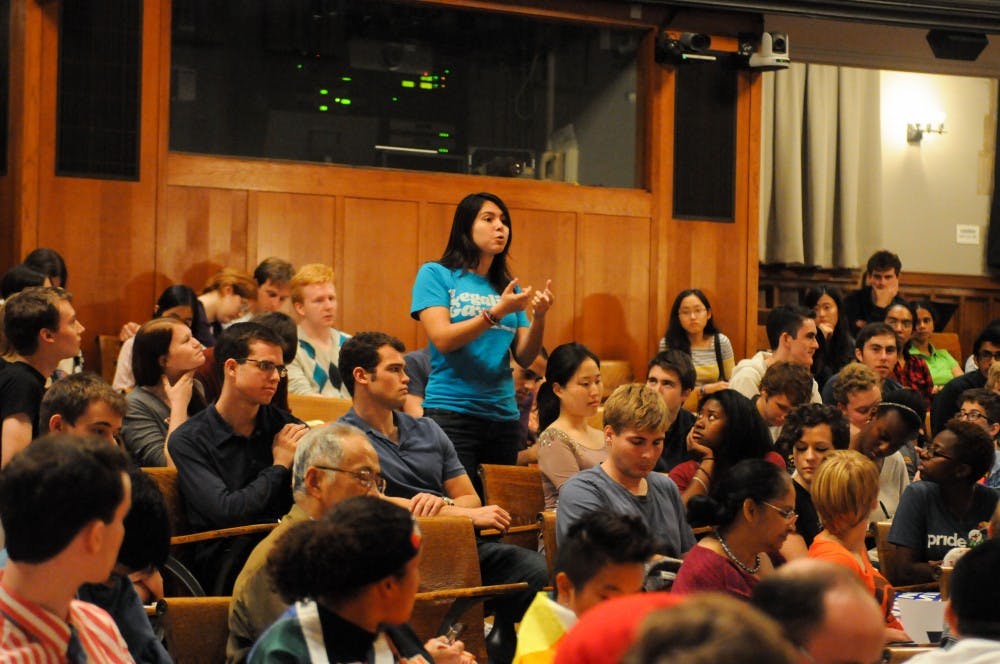Heritage Foundation fellowRyan T. Anderson ’04 argued for a traditional conception of marriage as a union between one man and one woman in an event sponsored by the Anscombe Society and the American Whig-Cliosophic Society on Thursday evening. About 30 students assembled outside of McCosh 50 before the talk in support of same-sex marriage.
Before the event, members of the Princeton Equality Project gathered at the building entrance handing out pins and posters to arriving audience members. A number of students came draped in rainbow flags.
PEP member Kelsey Dyer ’17 said many members of the LGBT community had come to respectfully hear what Anderson had to say while also making their presence known in hopes that the event could be part of an ongoing dialogue about the meaning of marriage.
The group of students supporting same-sex marriage entered the building in the last few minutes before the lecture was set to begin, their Marriage Equality signs visibly scattered throughout the audience once the lecture started. PEP President Tzu-Yung Huang ’15 reminded students before they entered to be respectful during the event.
Although Anscombe Society President Ben Koons ’15 reminded students that audience members would be removed if they disrupted the events, Anderson’s lecture proceeded without interruption, even eliciting some laughter when he showed how redefining marriage could lead to accusations of polyphobia.
Anderson presented his argument, which he developed in a book titled "What is Marriage?"with Sherif Girgis '08 and politics professor Robert George, as grounded in philosophy and public policy, rather than morality or tradition.
In a philosophical vein, Anderson used anAristotelian analysis involving the terms of action, goods and commitmentto arrive at a definition of marriage. He also said that the definition of marriagebetween a man and a womanis found in many different cultures at many different periods.
“There’s something about this understanding of marriage that resonates with human nature,” he said.

Moving on to the realm of public policy, Anderson argued that the government should regulate marriage and noted the benefits for children who grow up in households with mothers and fathers.
Anderson repeatedly referred to a statement President Obama made during his 2008 campaign that children who grow up without fathers face more challenging lives with higher chances of failure. Anderson described marriage as a private relationship with public consequences, which therefore relied on government involvement to reward a marriage culture more supportive of successful children.
Anderson also emphasized that the state should not ban same-sex marriage, but rather provide incentives for traditional marriages. He invoked examples to illustrate some of the consequences of redefining marriage. In one example, he cited the measures taken insome statesto shutdown orphanages that only provide adoptions into traditional man-woman households. This practice, he said,has resulted in fewer adoptions and a worse overall outcome for orphans, contrary to its creators' original intention of increasing the number of households that could adopt.
In the question-and-answer session following the lecture, several questions challenging Anderson's argument received snaps and even applause. Many of these questions were prefaced with long statements challenging Anderson'spoints.

In her question, Co-President of the Princeton Pride Alliance Christina Chica '15 accused Anderson of “conflating gender with sex” and being “ignorant of studies that have been done in gender and sexuality.” Anderson eventually cut her off with a polite but forceful “I thank you for asking a civil question.”
Anderson gave tongue-in-cheek replies to a few questions, including oneabout man-boy pederasty in ancient Greece, which he sarcastically praised as "a good use of time."
The event ended in a round of loud and hearty applause.
Correction: Due to a reporting error, an earlier version of this article omitted the class year of Sherif Girgis '08. The 'Prince' regrets the error.








